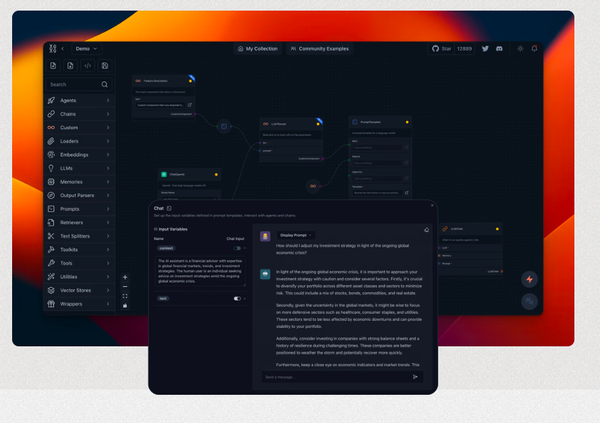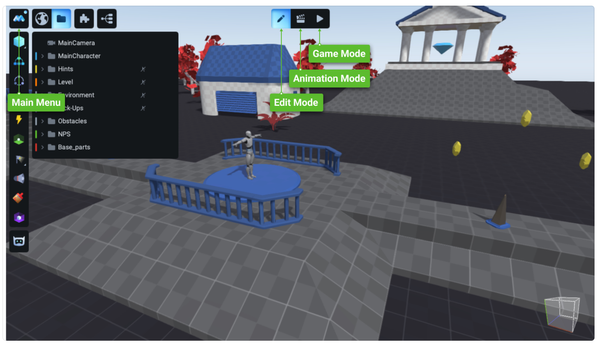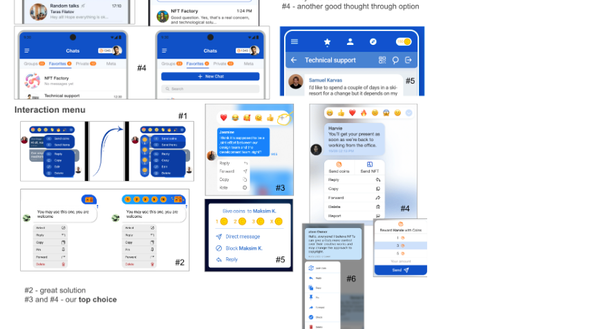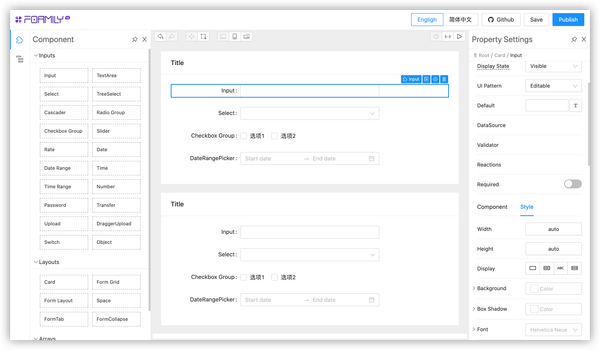14 Top Open-source Low-code and No-code Platforms for Building Internal Tools
What are Internal Tools?
Internal tools refer to software applications or systems that are developed and used within an organization to support internal processes and operations. These tools are specifically designed to meet the unique needs and requirements of the organization.
Why Enterprises Need Internal Tools?
Enterprises may need to build internal data tools for several reasons. Firstly, internal tools help in organizing and managing large volumes of data generated within the organization. They provide data analysts with the necessary tools to extract insights, perform data analysis, and generate reports.
Internal Tools for Business Developers
For business developers, internal tools facilitate the identification of market trends, customer behavior, and opportunities for growth. These tools enable them to make informed decisions and develop effective strategies to drive business growth.
For Data engineers
Data engineers rely on internal tools to manage data pipelines, automate data workflows, and ensure data quality and integrity. These tools streamline the data engineering process and help in building robust and scalable data infrastructure.
For Marketers
Marketers benefit from internal tools by gaining access to customer data, enabling them to personalize marketing campaigns, target specific customer segments, and measure the effectiveness of their marketing efforts.
For Sales
Sales teams leverage internal tools to track customer interactions, manage leads, and improve sales forecasting. These tools enhance sales productivity and enable teams to effectively manage customer relationships throughout the sales process.
Overall, internal tools provide numerous benefits across different roles within an organization, including improved data analysis, informed decision-making, streamlined processes, enhanced productivity, and better customer insights.
In the following list, we have compiled the best open-source tools for building feature-rich and powerful internal tools.
1️⃣
ToolJet

ToolJet is an exceptional open-source low-code framework that empowers developers to swiftly and efficiently build internal tools and applications. With its intuitive visual interface and comprehensive set of pre-built components, developers can effortlessly create custom UIs, workflows, and data models without the need for extensive coding.
ToolJet empowers developers to effortlessly design and customize dashboards, forms, and workflows to streamline internal processes. It seamlessly integrates with various data sources and offers user-friendly features such as drag-and-drop builders, robust data modeling, and advanced user access control.
By leveraging ToolJet, developers can craft internal tools that perfectly align with their unique requirements. Its flexible and modular architecture allows for easy extension of functionality through custom code and integrations.
ToolJet is an ideal choice for developers seeking to build internal tools, as it provides a user-friendly low-code development environment that simplifies the creation of custom applications. Moreover, its open-source nature encourages community contributions, fostering a collaborative platform for continuous improvement.
2️⃣
Refine
Refine is an open-source tool for building internal tools and applications. It provides a visual interface and a set of pre-built components that allow users to create custom applications without the need for extensive coding.
With Refine, developers can quickly design and customize dashboards, forms, and workflows for their internal processes. It offers features like drag-and-drop builders, data modeling, and user access control, making it easy to create tailored internal tools.
Refine focuses on simplicity and ease of use, allowing non-technical users to build and iterate on internal tools without relying heavily on developers. It also provides integration capabilities, allowing users to connect their tools to various data sources and services.
The goal of Refine is to streamline the process of building internal tools and empower teams to create custom solutions that suit their specific needs. It has an active community of developers who contribute to its continuous improvement and provide support to users.
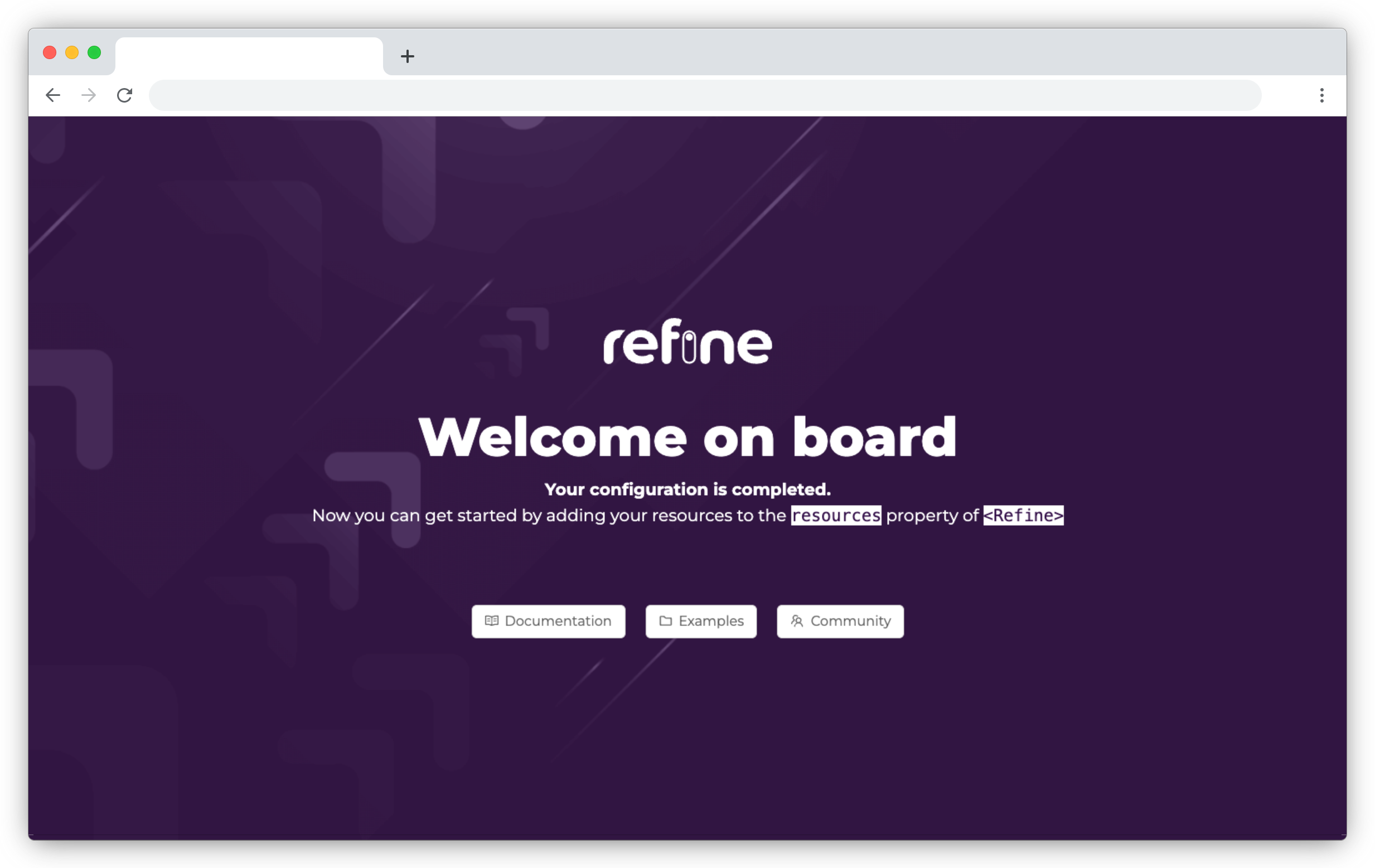
3️⃣
Windmill
Windmill is an open-source tool for building and automating internal tools. It offers a visual interface, a powerful scripting engine, and features like form filling and UI testing.
Windmill is designed to be user-friendly and accessible to users with different levels of technical expertise. It provides a browser extension that allows users to record interactions with web applications and generate code snippets automatically. This feature simplifies the process of creating automated tests and workflows.
Windmill is well-suited for building internal tools because:
- Automation: Windmill allows you to automate repetitive tasks and streamline internal processes, increasing efficiency and productivity.
- Customization: With its scripting engine, Windmill provides flexibility to create custom workflows and integrate with different systems and services.
- Simplicity: The visual interface and code generation capabilities of Windmill make it easy to create tools without extensive coding knowledge.
- Collaboration: Windmill supports version control and collaboration, enabling teams to work together on tooling projects.
- Active Community: Windmill has an active community of contributors who provide support, contribute new features, and help improve the platform.
4️⃣
Budibase
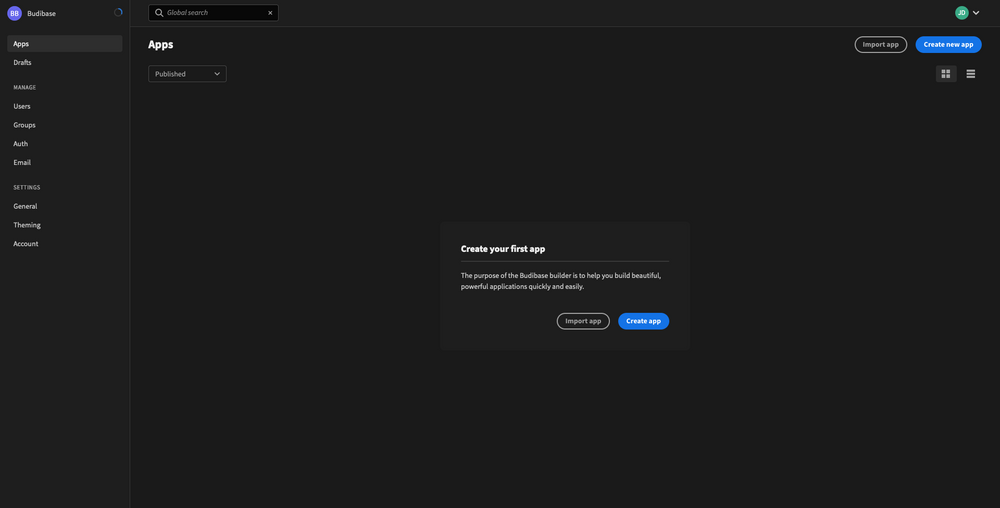
Budibase is an open-source platform for building internal tools and applications. It provides a visual interface and a low-code approach that allows users to create custom tools without extensive coding.
With Budibase, you can easily design and customize dashboards, forms, and workflows for your internal processes. It supports various data sources and offers features like drag-and-drop builders, data modeling, and user access control.
Budibase is good for building internal tools because:
- Low-Code Development: Budibase's visual interface and low-code approach make it accessible to non-technical users and enable rapid development of internal tools.
- Customizability: Budibase allows you to customize your tools according to your specific requirements, including designing the UI, defining workflows, and configuring data models.
- Data Integration: Budibase supports integration with various data sources, allowing you to connect your tools to databases, APIs, and other services.
- User Access Control: Budibase provides features for managing user roles and permissions, ensuring that only authorized users can access and interact with your internal tools.
- Open-Source Community: Being an open-source project, Budibase has an active community of contributors who provide support, contribute new features, and help improve the platform.

5️⃣
Appsmith
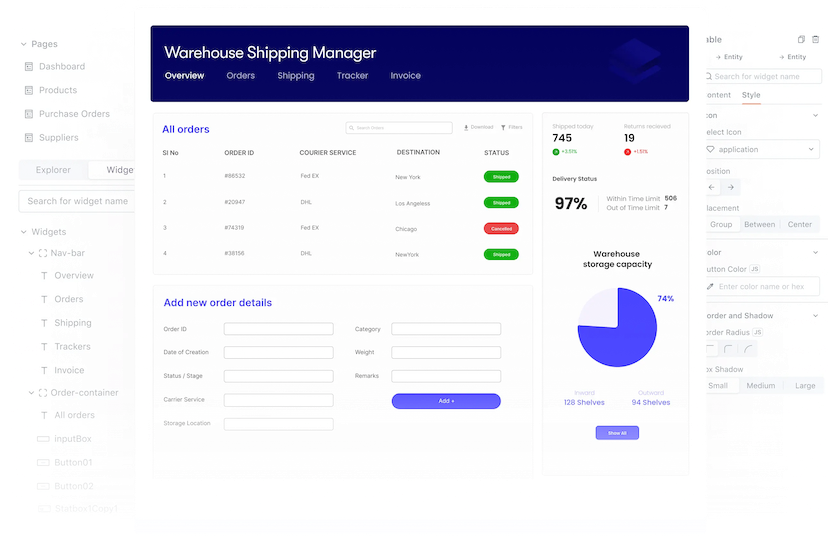
Appsmith is an open-source, low-code platform for building internal tools and applications. It provides a visual interface for creating custom UIs, workflows, and data models without extensive coding.
With Appsmith, developers can connect to various data sources, including databases, APIs, and third-party services, to build powerful internal tools. It offers pre-built components like forms, tables, charts, and notifications that can be easily customized and integrated.
Appsmith supports collaboration, version control, access control, and deployment options to streamline development and deployment.
Developers can quickly build internal tools with minimal coding using Appsmith's low-code capabilities. It also allows custom scripting and integration with external code for complex scenarios.
Appsmith is ideal for building internal tools with its simple interface, extensive integration options, and ability to customize and extend functionality through code. It enhances team productivity and efficiency.
6️⃣
Illa Builder
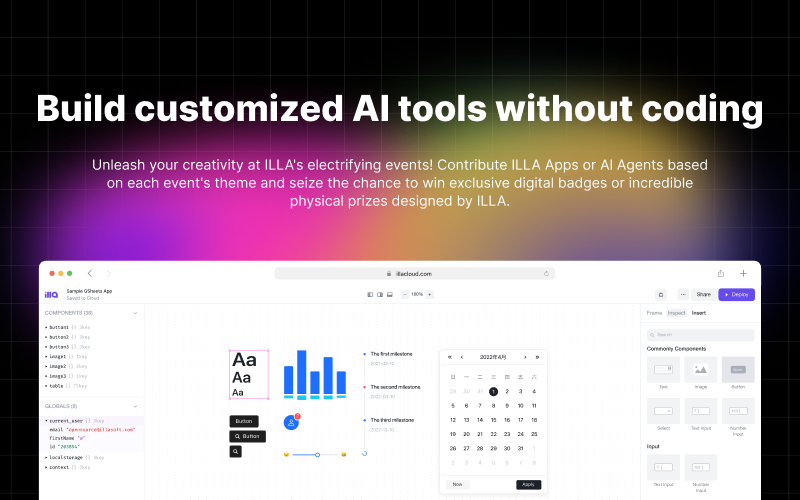
illa-builder is a super handy tool for making web applications. It comes with a bunch of ready-to-use components and utilities that make it a breeze to create web apps without having to do a ton of coding.
With illa-builder, you can quickly set up your app's structure, handle data binding and state management, and make components that you can reuse. It works with different front-end frameworks and libraries, like React and Vue.js, and makes the whole development process smooth and easy.
7️⃣
Yao
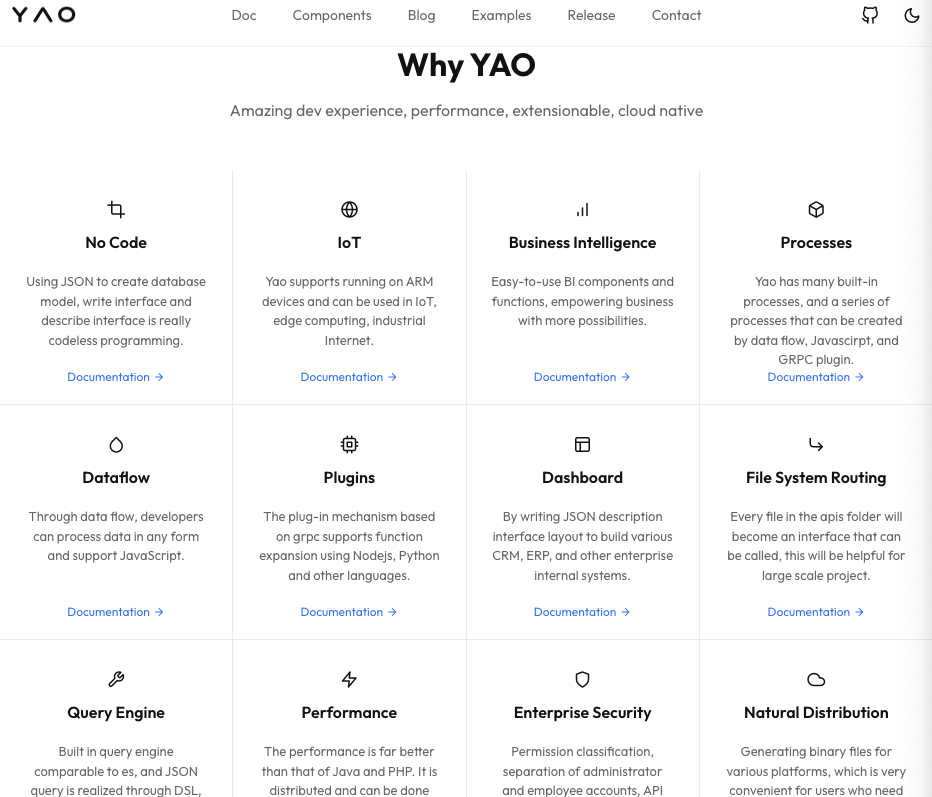
Yao is an open-source, low-code platform for building internal tools. It provides a visual interface and a set of pre-built components that allow users to create custom applications without the need for extensive coding.
With Yao, you can easily design and customize dashboards, forms, and workflows for your internal processes. It supports various data sources and offers features like drag-and-drop builders, data modeling, and user access control.
8️⃣
Lowdefy
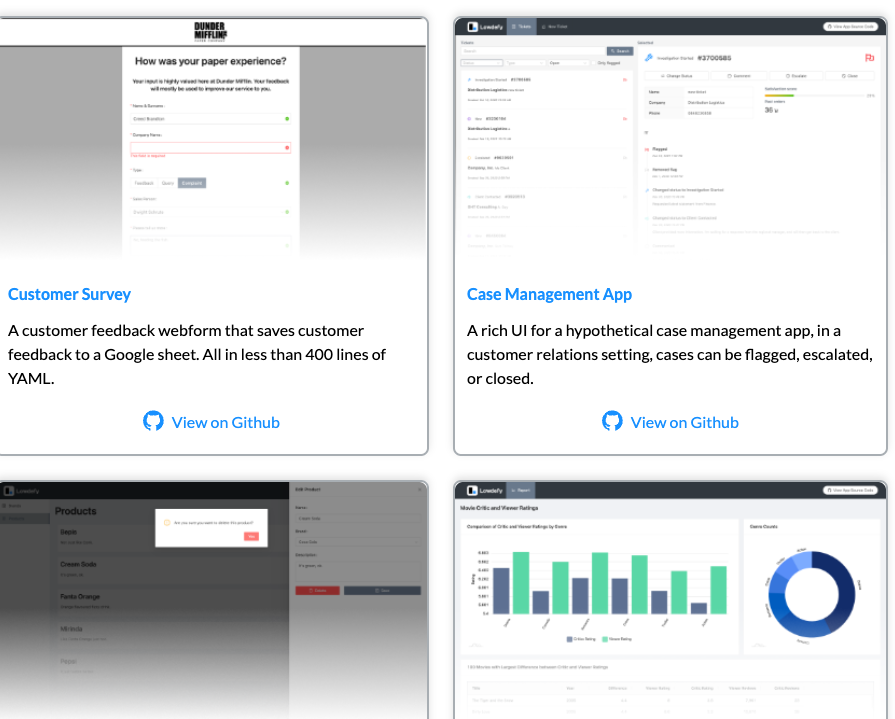
Lowdefy is a super cool open-source framework for building web apps. You can use it to create awesome apps without having to write a ton of code. Lowdefy comes with lots of ready-to-use components and works great with different data sources and services.
With Lowdefy, developers can quickly and easily build web apps using its simple and modular structure. It has cool features like data binding, form validation, and user authentication. And guess what? Lowdefy even has a command-line interface (CLI) so you can build, deploy, and test your apps like a pro!
The goal of Lowdefy is to simplify the process of building web applications and make it accessible to a wider range of users, including non-technical users. It provides a visual interface that allows users to design the application's UI, define data models, and configure business logic without writing extensive code.
9️⃣
NocoBase
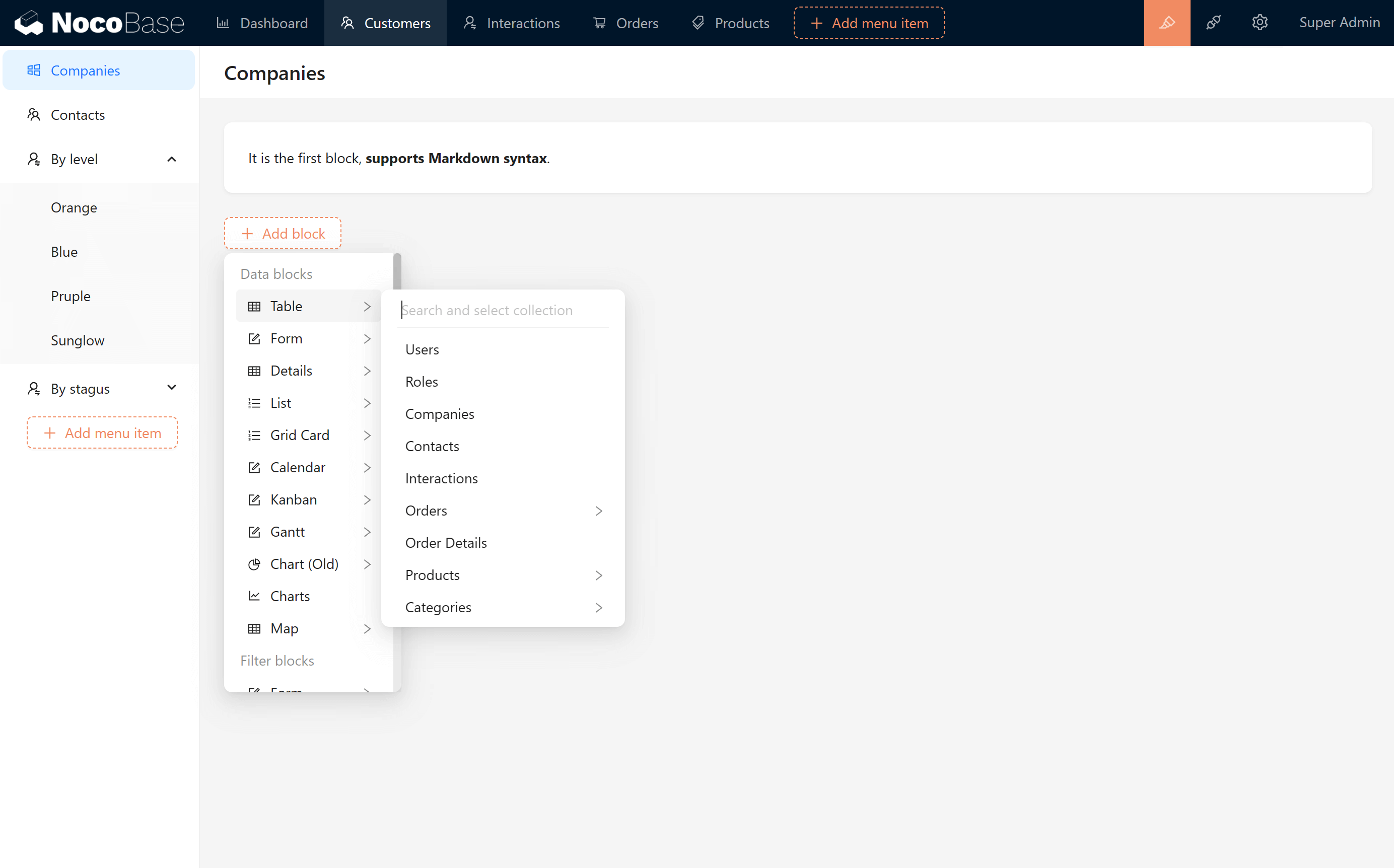
NocoBase is a cool open-source tool for managing databases. It's super easy to use and you can host it yourself. It lets you create, manage, and visualize your databases with a really user-friendly interface.
NocoBase is perfect for building internal tools and apps. You can easily make custom dashboards, reports, and forms to work with your databases. It works with different databases like MySQL, PostgreSQL, and SQLite, so it's compatible with all sorts of data sources.
With NocoBase, you can build awesome customizable internal tools that need database management and visualization. It has cool features like drag-and-drop UI builders, customizable data views, and the ability to create relationships between tables. Plus, it lets you set user roles and permissions, so you have control over who can access your databases.
🔟
APITable
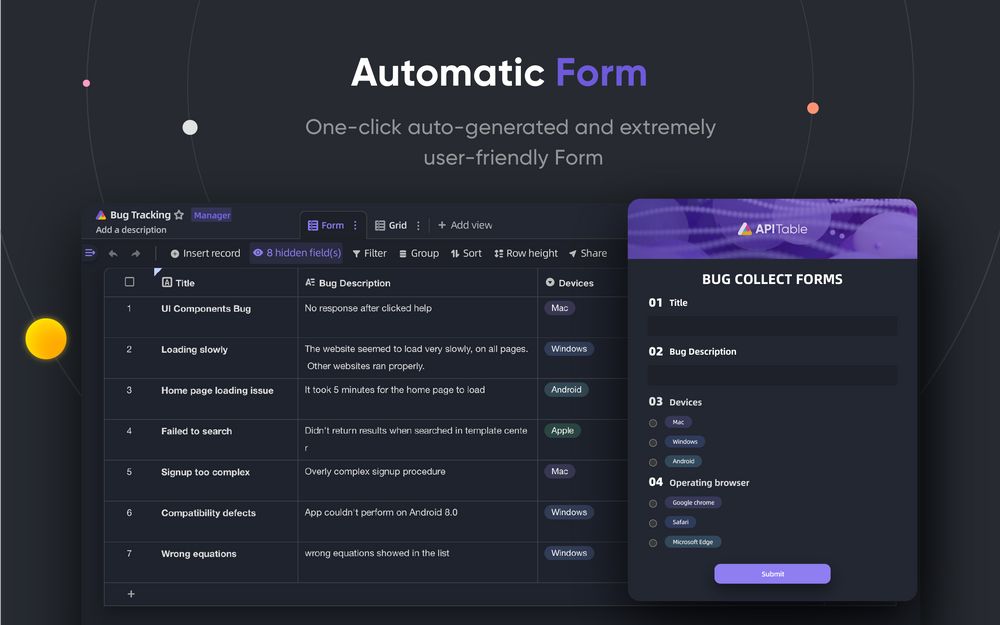
Apitable is a powerful low-code platform for effortlessly building internal and web tools. It offers a user-friendly visual interface that empowers users to create custom applications without the need for extensive coding. With Apitable, you can effortlessly construct forms, workflows, and dashboards to streamline your internal processes and foster seamless collaboration.
The platform provides a wide range of features to simplify development, including intuitive drag-and-drop builders, pre-built components, and seamless integrations with popular tools and services. It also supports advanced data modeling capabilities and offers flexible options for data storage, retrieval, and manipulation.
By adopting Apitable's low-code approach, even non-technical users can confidently create and personalize internal and web tools, reducing reliance on developers and significantly expediting the development process. This empowers teams to rapidly iterate and adapt their applications to meet evolving business requirements.

1️⃣1️⃣
Rowy
Rowy is an open-source, low-code platform for building internal tools on top of Google Firestore. It offers a visual interface for creating custom dashboards, forms, and workflows, making it easy to build and customize internal tools without writing extensive code.
Rowy leverages the power of Google Firestore, a scalable and flexible NoSQL database, to store and manage data. It provides features like real-time data sync, authentication, and access control, which are crucial for building collaborative internal tools.
With Rowy, you can create custom views to visualize and interact with your data, define workflows and automations using triggers and actions, and set up user roles and permissions to control access to your tools.
One of the advantages of Rowy is its low-code approach, which allows non-technical users to build and customize internal tools without relying heavily on developers. It provides a drag-and-drop interface and pre-built components, making it accessible to a wider range of users.
While Rowy offers a promising solution for building internal tools, it's important to consider your specific requirements and evaluate if it aligns with your needs. It's recommended to explore the features, documentation, and community support of Rowy to determine if it's a good fit for your internal tool development.

1️⃣2️⃣
NocoDB
NocoDB is an open-source, self-hosted, and easy-to-use database management tool. It allows users to create, manage, and visualize their databases with a user-friendly interface.
NocoDB is specifically designed for building internal tools and applications. It provides a simple and intuitive way to create custom dashboards, reports, and forms to interact with your databases. It supports various databases like MySQL, PostgreSQL, and SQLite, making it compatible with different data sources.
With NocoDB, you can easily build internal tools that require database management and visualization. Its features include drag-and-drop UI builders, configurable data views, and the ability to create relationships between tables. It also supports user roles and permissions, allowing you to control access to your databases.
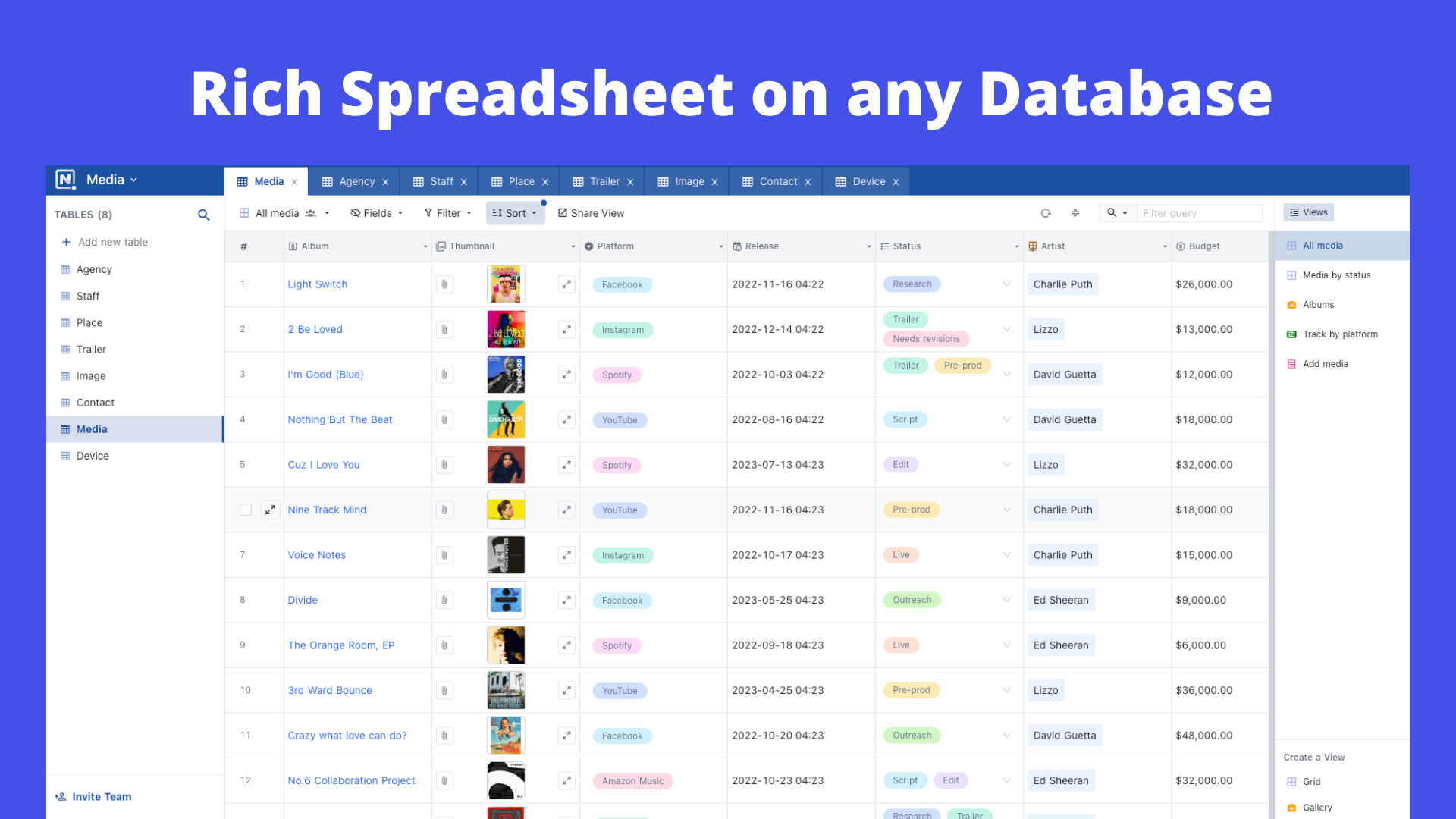
1️⃣3️⃣
R3: The Ideal Choice for Building Internal Tools
R3 is an open-source SDK that offers simplicity, flexibility, modularity, seamless integration, and a thriving community for effortlessly building internal tools.
Overall, r3 is a good option for building internal tools due to its simplicity, flexibility, modularity, integration capabilities, and active community support.
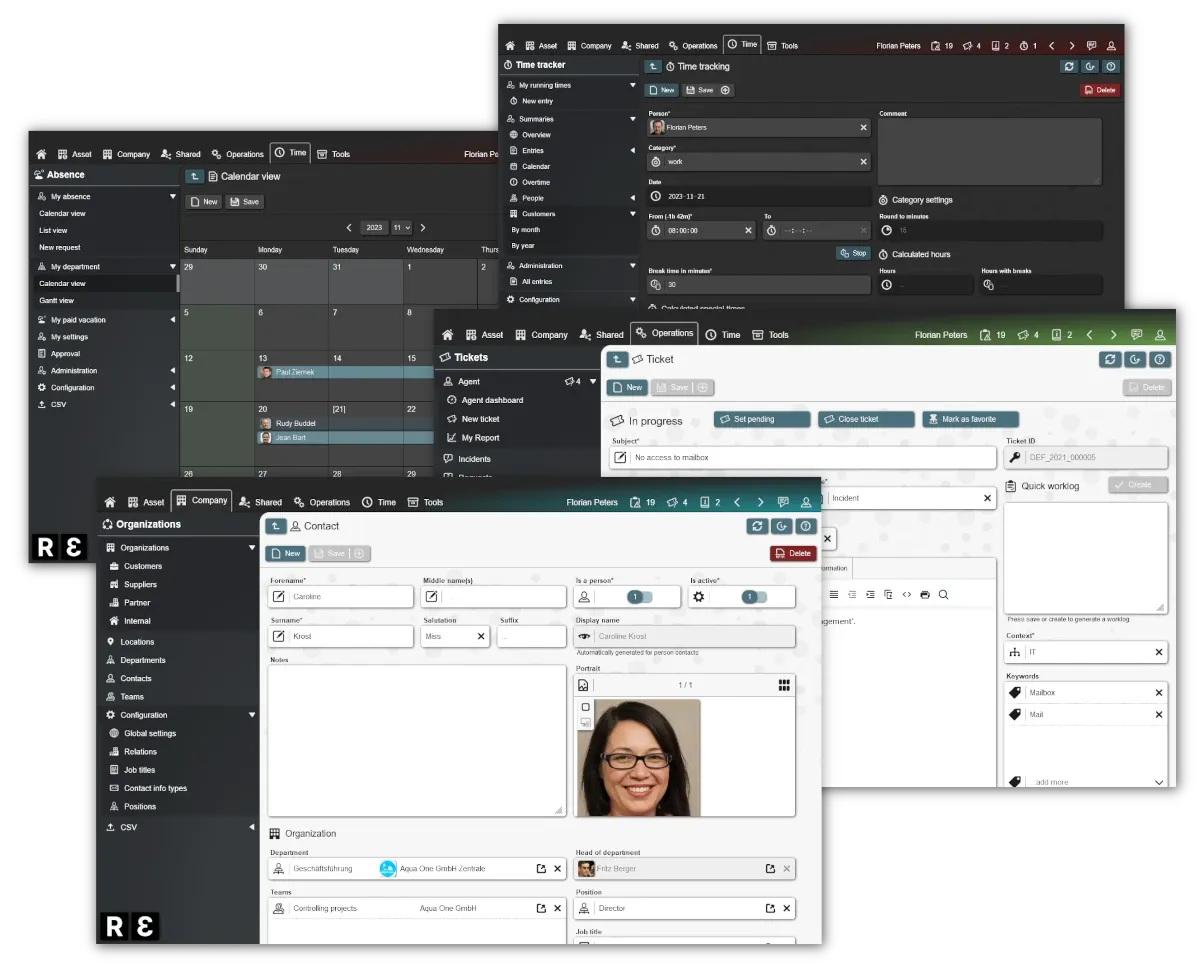
1️⃣4️⃣
Meteor
Meteor is a full-stack JavaScript platform that allows for rapid development of web and mobile applications. It provides a set of integrated tools and libraries that streamline the development process and make it easier to build real-time, cross-platform applications.
One of the reasons why Meteor is good for building internal tools is its simplicity and ease of use. It uses a single language, JavaScript, both on the client and server side, which simplifies the development process and reduces the learning curve. This means that developers can quickly build and iterate on internal tools without having to switch between different languages or frameworks.
Meteor also has built-in features for real-time data updates, which is essential for many internal tools. It allows for automatic data synchronization between the client and server, so users can see real-time updates without having to manually refresh the page. This is particularly useful for collaborative tools or applications that require instant updates.
Furthermore, Meteor has a strong ecosystem with an active community and a wide range of packages and resources available. This makes it easier to find solutions to common problems and leverage existing tools and libraries when building internal tools.
Over the years, I used Meteor to build internal tools for personal and business use.




